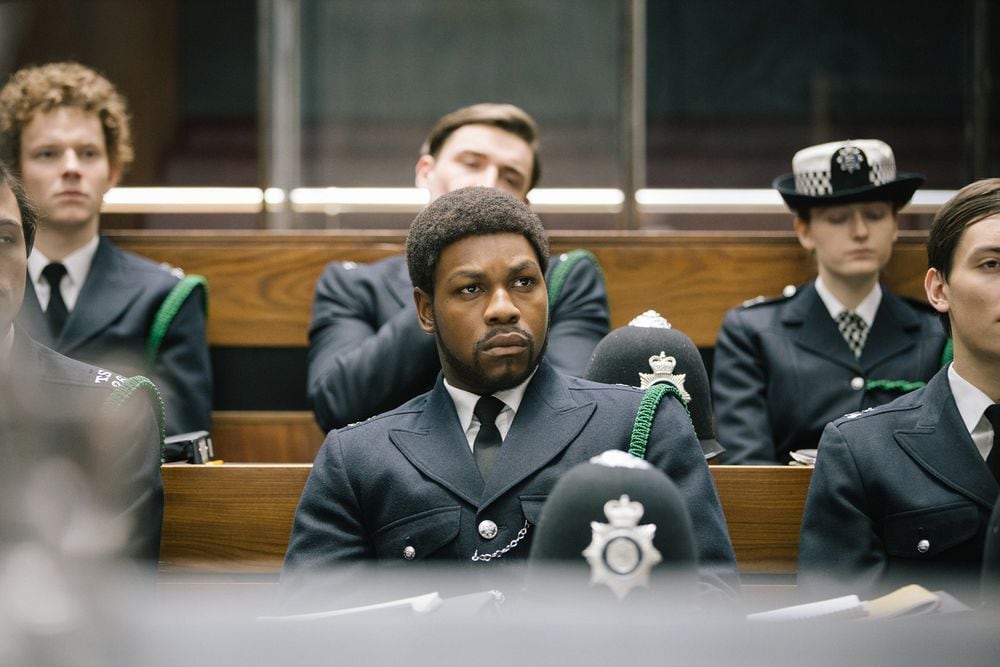The third film of Small Axe, Steve McQueen’s collection of five films on Afro-Caribbean immigration in the United Kingdom between the 1960s and 1980s rises a notch above the previous two. Bright both, both Mangrove as Lovers Rock at times they could sin in a certain mannerism – ideological, the former; aesthetic, the second -, on the other hand, this Red white and blue it is presented as a story that incites debate, not so much anger or dance.
This is a true story of the black police officer Lery Logan, played by a John Boyega who seems to have seen himself several times Serpico before facing his role. Logan is a young aspiring scientific researcher in London in the early eighties who decides to abandon this career to enter the police force. His father, played by Steve Toussaint, is a serious man, one of those who hate the police not because they are against order and rectitude – he refuses to win a Scrabble game because he must put a dirty word to do so – but because he knows that the police are against his existence as a human being.
That is why, when just after receiving a beating by two officers who unjustly accuse him of blocking the street with his vehicle and he learns that his son has filled out the form to enter the police force, it is not that he feels disappointed , feels betrayed. How is anyone going to give up something so beneficial to themselves, to society, and even to other children of immigrants as a career in research to enlist in law enforcement?
The son’s dilemma is to be an example of how the system is changing or to try to make the system change. Interestingly, we have been taught to believe more in the first than in the second. This was already denounced by the philosopher Cornel West when interviewed after the murder of George Floyd. He spoke of the false sense of progress in equality that comes from the existence of black millionaires, black elite athletes, black vice presidents … Black researchers. Logan has the option to be one more in that league. It is a success and a pride.
But his aunt and a partner in his athletic training convince him that he could be a good police officer. He, who already in the first scene has seen how the agents in London spend their time with those of race – they search him very badly as a child while he waits at the door of the school for his father to come to pick him up -, believes that he can help that change a lot more by entering the body than, namely, isolating antibodies. He denies the principle of setting an example through success and embraces something much more mundane, much more ambitious in social terms, although, as seen at the end in a very subtle way (with a photo of Elizabeth II), it is morally more complicated to manage. In the London of the eighties, it seemed more plausible to find a cure for cancer than to get the police to stop being a racist establishment. Let no one come to Logan and say that he chose the easy way. This is a story of pragmatism, not resignation.
Steve McQueen manages to underpin the debate that the film proposes not only through Bayoga’s magnificent work, but also with the presence of a brilliant troop of secondary, whose role is to present all possible doubts from all angles. In addition to a father who feels betrayed, there is a girlfriend in love but scared, an aunt convinced that the police are the best option, even if her way of verbalizing it is not the most empathetic, a naive and white police officer friend or a cousin , a pop star, who best exemplifies success in a hostile land. At one point in the movie, Logan is at his house dancing with a drink in hand. Liquid is poured on the carpet and the musician cousin gets angry and runs to the kitchen to get a rag to try to save that carpet that costs what a policeman should charge in a month. “If I lived in this house I wouldn’t worry about anything,” the future agent snaps at him. Although Logan values and even envies his cousin’s life, he has chosen for himself a life in which the rest of his days will be spent using coasters.
–


